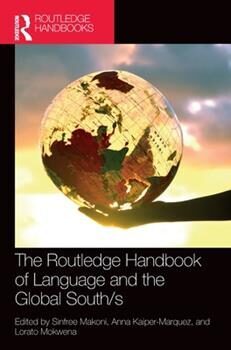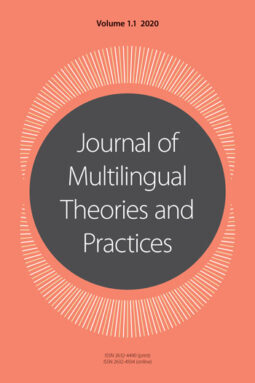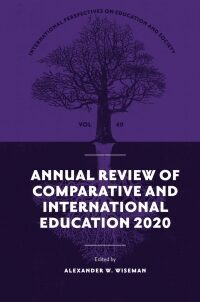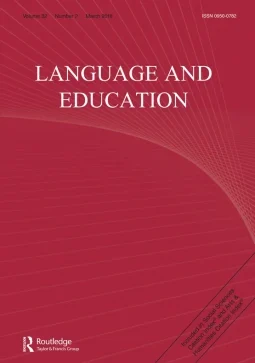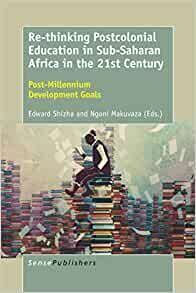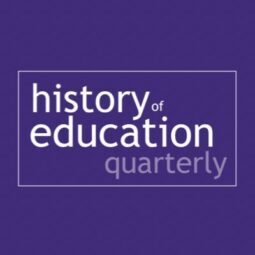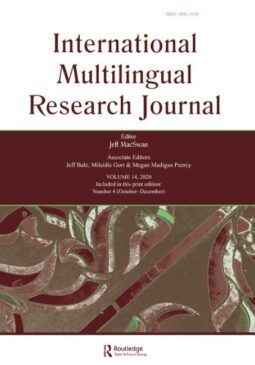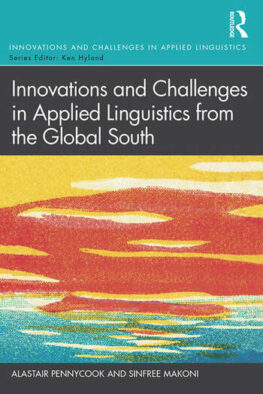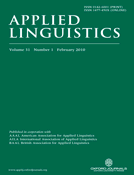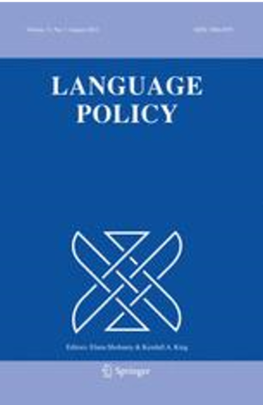Resources
I. Publications
Palimpsest of Tangled Dramas: Language and Education beyond Institutional Formations. 2022. The Routledge Handbook of Language and the Global South/s.
The intersections of Southern perspectives on applied linguistics with decolonial thinking reveal the precarity of trespassing epistemic borders in search of other geoepistemic centers of gravity as a strategy for sorting out the colonial matrix of knowledge and power that organize contemporary life. Coloniality itself thrives on its propensity to selectively appropriate—and therefore, dismantle—its own dissent, a strategy that recursively (re)produces images of Eurocentric universalism through an unrelenting politics of occlusion. Southern perspectives reveal the epistemic significance of this politics in the colonial invention of so-called indigenous languages and its appropriation in education (e.g., in bilingual and mother tongue-based multilingual education). But the transformation of indigenous linguistic ecologies, by way of invention, occurs in tandem with the transmogrification of knowledge, knowing, and educational processes, by way of institutionalization, through the same standardizing, universalizing, colonizing matrix. Thus, the project of “disinventing and reconstituting languages” must unfold simultaneously with the deinstitutionalization of knowledge and education, an entangled agenda that needs a recalibrated focus on interspaces to extend the border gnosis of decolonial thinking.
Translanguaging as Decolonial Praxis: Pedagogic and Epistemic Thrusts in the Politics of Official Knowledge. 2022. Journal of Multilingual Theories and Practice.
Epistemic ruptures in normative conceptualisations of language bring into sharper focus the absurdities of education in entrenched linguistic and disciplinary regimentations. At a time when neoliberal forces push educational processes farther from traditional disciplinary arrangements and towards nuclear marketisation of knowledge and processes of knowledge production, the convergence of epidemiological and social crises occasioned by the Covid-19 pandemic forces educators to recalibrate pedagogical structures that have guided schooling processes for decades. Drawing insights from two emergency remote courses, this article examines the pedagogical and conceptual thrusts of translanguaging in US higher education. It outlines specific ways in which the institutional formations of knowledge – its (re)production, structuration and transaction – undercut the logic and political potency of translanguaging. Specifically, it locates translanguaging within a broader constructionist linguistic ontologism, which now provides conceptual tools for readjusting the epistemic aperture through which new cultural attitudes to knowledge – and to education – can materialise institutional transformations towards what Lewis Gordon (2021) calls ‘teleological suspension’. While public consciousness remains inured to the presumed cultural neutrality and political benignity of schooling as pervasive social practice, this study contends that it is precisely in the ubiquitous subtleties of institutional formations that the politics of official knowledge exercises most effectively its technologies of cultural control, and of exploitation. As such, the epistemic shifts which translanguaging and similar expressions of constructionist linguistic ontology invite extend far beyond language policy changes and point to radical social transformations.
Language Revolution: Education and Social Change at Linguistic Crossroads. 2020. Annual Review of Comparative and International Education.
Three distinctive domains of inquiry in comparative and international education (CIE) point to epistemic fault lines that simultaneously enable and disable the possibilities for social transformation in the cultural ecologies that demarcate, but also entangle, the so-called Global South and the North. Historically, these domains of inquiry – language/multilingualism, education, and development – engage arenas in which ideas about wellbeing, social arrangements, and the politics of knowledge (and of power) are constantly constructed, contested, and renegotiated. This analysis pinpoints some of the discursive technologies, which guarantee that active scholarly innovations and differentiation proceed in ways that ultimately leave intact the territorialized regionalizations of development differences. It reflects on ongoing fieldwork from the South to highlight three spheres of social control, and struggle, illustrative of the coloniality of difference and the expanding institutionalization of learning (as schooling) in an era of global interventionism. These loci – the sources of knowledge traditions, the sites of its enactment, and the power of knowledge transactions – represent overlapping activation points through which education interventions both stimulate and stultify social transformations. Specifically, the sources, sites, and power of knowledge offer empirical and discursive tools for historiographic reconsideration of the role of linguistic diversity and education in social change processes, and, crucially, for shifting critical focus from merely the occidentality of contemporary education traditions to the universalism of its social imaginaries. In this critical reading of new understandings of language(s) as invention, therefore, lies analytic opportunities for rethinking epistemic dilemmas in linking education and “development” in CIE scholarship.
Transitional multilingualism and mixed messages of multilingual education in Africa: Necessary compromise or policy impediment. 2019. Language & Education.
Despite advances in multilingual education (MLE) scholarship, education in most African societies remain characteristically congruent with colonial normative monolingual and transitional multilingual policies, which limit the use of native language(s) as media of instruction to early primary schooling. This contributes to poor educational and social outcomes far below the projected benefits of MLE. Convinced that the complex relationships between language and education have been discerned, MLE scholarship has become increasingly advocacy oriented to corresponding policies and practices, with purportedly widespread resistance from parents, policymakers, and educators. This focused ethnographic inquiry into the perspectives of parents, educators, researchers, and policymakers on MLE finds mixed messages in MLE advocacy that foment localized resistance to and disincentivize full native language-based MLE (NLB-MLE) policy changes. Specifically, transitional multilingualism, a compromise with NLB-MLE opposition, entails inherent instrumentality and linguistic hierarchy, which undermines the fundamental principles of linguistic and cultural diversity that is the hallmark of NLB-MLE. Considering the colonial, political, and scientific sources of transitional multilingualism, the findings support a reconfiguration of the intellectual anchorage, social agenda, and discursive scope of MLE scholarship to address the strategic challenge, which transitional multilingualism poses to NLB-MLE policy shift and its pedagogical and cultural promises.
Linguistic diversity and education: From incremental reform to radical social change. 2017. Re-thinking Postcolonial Education in Sub-Saharan Africa in the 21st Century.
It is almost unthinkable for new students of language and education that barely half a century ago, the official wisdom, based on then cutting-edge research, considered multilingualism bad for individuals and society. Today, the far-reaching benefits of linguistic diversity has become so well established in scholarly circles that language planning stakeholders have, gradually but assuredly, shifted from research to policy advocacy and grassroots multilingual education (MLE) programming.
Historiographic reconsideration of colonial education in Africa: Domestic forces in the early expansion of English schooling in Northern Igboland, 1890-1930. 2016. History of Education Quarterly.
Mainstream historiography often turns to Europe’s era of empire building to explain the expansion of Western formal education in Africa. Popular accounts suggest that in Africa (1) colonial involvement in education was late and short lived, spanning the early decades of the twentieth century, (2) missionaries were largely responsible for early educational expansion, and (3) education expansion resulted from interdenominational rivalries among missionaries. However, these popular narratives inadequately account for Africans’ own responses to colonial education. This study examines social and cultural shifts in northern Igboland in southeastern Nigeria between 1890 and 1930. It uses colonial archives and oral sources to demonstrate that beyond missionary rivalry, domestic contests converged with the fledgling colonial process to promote English education in northern Igboland. To accomplish this task, the article reviews methodological assumptions responsible for marginal attention to the agency of the colonized in the historiography of Western education in former colonies.
Antinomies of ideologies and situationality of education language politics in multilingual contexts. 2015. International Multilingual Research Journal.
Widespread scholarly and political attention to language-related inequities in the 20th century precipitated a spate of orientations to language planning in multilingual societies. While various orientations indicate a shift from earlier deficit to affirmative views of multilingualism, vigorous debates persist about the logical and pragmatic merits of each orientation. The resulting advocacy for language and multilingualism has yet to result in widespread mother-language-based multilingual education policies and practices. This article reviews a strand of these debates (language as right or resource) and argues that these debates deploy stringent criteria of rationality and social justice that are discontinuous with empirical realities of multilingualism and plurilingualism. It uses ethnographic evidence from India and Nigeria to demonstrate that, instead of the fixities of such criteria, actual language decision making in complex multilingual societies demands an integrative approach to theory, policy, and practice that is dialogic, tentative, and promotive of all possible languages.
Pennycook & Makoni (2020) Innovations and Challenges in Applied Linguistics from the Global South, New York: Routledge
Innovations and Challenges in Applied Linguistics from the Global South provides an original appraisal of the latest innovations and challenges in applied linguistics from the perspective of the Global South. Global South perspectives are encapsulated in struggles for basic, economic, political and social transformation in an inequitable world, and are not confined to the geographical South. Taking a critical perspective on Southern theories, demonstrating why it is important to view the world from Southern perspectives and why such positions must be open to critical investigation, this book charts the impacts of these theories on approaches to multilingualism, language learning, language in education, literacy and diversity, language rights and language policy; provides broad historical and geographical understandings of the movement towards a Southern perspective and draws on Indigenous and Southern ways of thinking that challenge mainstream viewpoints; seeks to develop alternative understandings of applied linguistics, expand the intellectual repertoires of the discipline, and challenge the complicities between applied linguistics, colonialism, and capitalism.
Written by two renowned scholars in the field, Innovations and Challenges in Applied Linguistics from the Global South is key reading for advanced students and researchers of applied linguistics, multilingualism, language and education, language policy and planning, and language and identity.
Makoni & Pennycook (2007) Disinventing and Reconstituting Languages, Clevedon: Multilingual Matters
In his trenchant critique of structural linguistics, Bordieu (1991) observes that linguistics as an academic discipline has been far too pre-occupied with idealist, abstracted approaches to the study of language-examining language in isolation from the social and political conditions in which it is used. As he comments ironically of this process: 'bracketing out the social [...] allows language or any other symbolic object to be treated like an end in itself, [this] contributed considerably to the success of structural linguistics, for it endowed the "pure" exercises that characterise a purely internal and formal analysis with the charm of a game devoid of consequences' (1991: 34). Or as Mey observes, 'linguistic models, no matter how innocent and theoretical they may seem to be, not only have distinct economical, social and political presuppositions, but also consequences [...] Linguistic (and other) inequalities don't cease to exist simply because they [...] causes are swept under the linguistic rug' (1985: 26).
Wright (2007) “The right to speak one’s own language: Reflections of theory and practice,” Language Policy 6, 203-224 DOI 10.1007/s10993-007-9050-y
The right to speak one’s own language is a right that has only recently been enshrined in law. At first this right was only a negative right (i.e. the right to use one’s language in the private sphere without persecution or prejudice), not a positive right (i.e. the right to use one’s language in the public space, to be educated in the language, to deal with the state in the language, etc.). As the Council of Europe’s Charter for Regional and Minority Languages has been accepted and become law in a number of European states, we encounter a dilemma. In Europe, institutions such as the courts, bureaucracy and education, have tended to use a single standard. Now, minority and regional languages are rarely standardised. What should be done? This paper considers how languages have been treated as defined and static systems for the purposes of nation state language planning. Data from Italy and France reveal that this has become unacceptable practice today. It is at odds with our greater acceptance of diversity and our recognition of the essentially dialogic nature of language.
II. Websites
Penn State University African Studies Global Virtual Forum: Decoloniality and Southern Epistemologies
III. Videos
Boaventura de Sousa Santos on “Epistemologies of the South: Justice Against Epistemicide" at the African Studies Global Virtual Forum: Decoloniality and Southern Epistemologies
Contact the Igodo team
Follow us
Copyright © 2020-2023 Igodo Research. All Rights Reserved.
